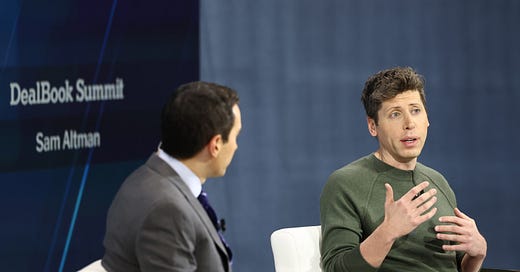Top Tech Execs Speak Kindly of Musk & Trump as Techno-Optimism Surges in Silicon Valley
David Sacks appointment as AI & crypto czar shows power shift
The Main Item
Tech Leaders Talk Up Musk & Brush Off AI Safety Risks On Stage
Sam Altman, Sundar Pichai, and Jeff Bezos waived off any concerns that Elon Musk is going to use his proximity to Donald Trump to give his business empire an edge over his competitors — or at least that’s what they said at the DealBook Summit this week.
Their remarks were part of a sunny, “what me, worry?” vibe both on-stage and across the industry in recent weeks.
Optimism about AI and deregulation under Trump is real, and there’s little upside in admitting any fears.
Bezos professed no worries about Musk and his tight relationship with Trump, who targeted Amazon during his first term. “I take at face value what has been said, which is that he is not going to use his political power to advantage his own companies or to disadvantage his competitors,” said Bezos.
He added that he was “proud” of his decision to block the Washington Post’s planned endorsement of Kamala Harris, a move denounced by former Post editor Marty Baron and others as cowardly kow-towing to Trump.
Altman also avowed trust that Musk wouldn’t abuse his position. “It would be profoundly un-American to use political power, to the degree that Elon has it, to hurt your competitors and advantage your own businesses. And I don’t think people would tolerate that,” he said.
You can read the friendly words from the two chieftains as appealing to Musk’s better nature — and also, perhaps, as carefully chosen to publicly frame any future self-dealing as “un-American.”
Altman spends much of his time these days evangelizing AI in public appearances and in writing, and his message this week was that the much-debated questions of whether and when artificial intelligence will reach human-level capabilities, or AGI, and what dangers that might pose, are not the right questions.
Reaching AGI will not be a big deal, he said, and certainly won’t change the nature of human society. “The economy will grow. The kinds of jobs people will do will change, and people will care way more and love their kids way more than they care about AGI and anything else that any technology can deliver,” he said. When Andrew Ross Sorkin asked him about the upcoming birth of his first child, he responded: “There's been nothing that has made AGI seem so irrelevant.”
As to the risks, he said they won’t really arise until we reach “artificial superintelligence,” or machines that are smarter than humans. Altman said that there was still “a long continuation” from where AGI is to what could be defined as superintelligence.
Pichai mentioned that Google’s Waymo self-driving cars can drive even better than human drivers, but there has been little fanfare: “The fact that Waymo in San Francisco drives better than humans, did we cross a threshold there? No one thinks about it that way.”
Pichai may be underselling the achievement: this Newcomer writer, for one, now instinctively regards Waymo cars as less dangerous than other vehicles when walking the streets of San Francisco—an important threshold for broad social acceptance.
Pichai didn’t share the alarm about AI safety risks that one-time Google employee and industry godfather Geoffrey Hinton and others worried about. Nor did he voice much support for AI regulation: “We are early enough in this technology, I would generally take a very pro-innovation approach. There is a lot of regulation already in place.”
Former OpenAI executive Mira Murati, a widely respected researcher who was briefly the CEO of OpenAI after the aborted ouster of Altman, was also on-stage this week, at a Wired conference in San Francisco, and she struck a similar tone.
“I’m really optimistic about the future,” she said, brushing off the notion that a “scaling wall” would slow progress in generative AI. “We’re about to see immense potential with abundance of energy and intelligence and even meaning.”
Murati left OpenAI last month and is widely expected to either launch a new venture of her own or join another AI startup, but she was mum on her plans.
Fading concerns about safety, at least in the public CEO conversation, may reflect the ascendance of “techno-optimism” ideology as the second Trump Administration begins.
On Thursday, Trump appointed David Sacks — a San Francisco-based venture capitalist and PayPal mafia veteran — as the White House “AI & Crypto Czar,” underscoring the power of Silicon Valley’s new right.
Let’s hope they use it wisely.
One Big Chart
Three Mega-Deals Drive November VC Funding Numbers
It was a good month to be a startup looking for $1 billion or more. New data from Crunchbase shows that roughly a third of global venture funding in November consisted of 10-figure checks to just three companies: xAI, Anthropic, and the engineering testing firm Tricentis.
Non-billion dollar rounds made up just under $18 billion of this month’s total venture funding.






